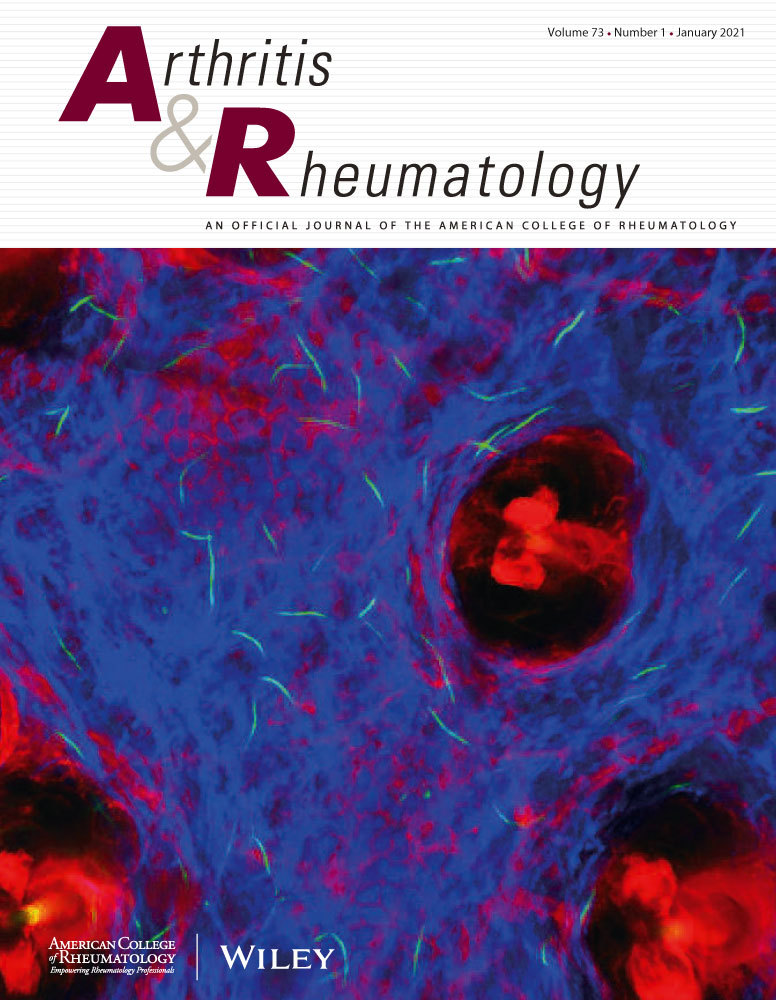外周血基因表达谱对系统性硬化症间质性肺疾病病程的预后有重要意义。
IF 11.4
1区 医学
Q1 RHEUMATOLOGY
引用次数: 0
摘要
目的:我们使用来自SENSCIS试验安慰剂组的数据来确定外周血(PBC)转录模块在接受和不接受霉酚酸酯(MMF)治疗的系统性硬化症相关间质性肺疾病(SSc-ILD)患者强制肺活量(FVC)过程中的预后/预测意义。方法SSc-ILD患者在≤7年内首次出现非雷诺症状。如果以稳定剂量服用MMF治疗≥6个月,则允许MMF治疗。在基线时采集PBC RNA样本。进行全球RNA测序,然后使用62个全血模块进行模块化分析。使用重复测量的混合模型分析第52周预测的FVC %下降的基线复合模块评分的预后意义。结果在服用MMF的患者中(n=120),较高的基线淋巴系和线粒体/蛋白质合成模块与预测的FVC %的较好病程相关,而较高的基线髓系和炎症模块与预测的FVC %下降较快相关。在未服用MMF的患者中(n=118),只有髓系谱系和炎症模块与预测的FVC %的更快下降有关。结论:在SENSCIS试验中的SSc-ILD患者中,无论MMF治疗如何,涉及髓系谱系的PBC模块与FVC的更快下降相关。在接受MMF治疗的患者中,较高的基线淋巴样蛋白、蛋白质合成和线粒体模块评分与较好的SSc-ILD病程相关。血液基因表达谱可能是SSc-ILD患者有用的预后/预测性生物标志物。本文章由计算机程序翻译,如有差异,请以英文原文为准。
Peripheral blood gene expression profiling shows prognostic significance for the course of interstitial lung disease in systemic sclerosis.
OBJECTIVE
We used data from the placebo arm of the SENSCIS trial to determine the prognostic/predictive significance of peripheral blood cell (PBC) transcript modules for the course of forced vital capacity (FVC) in patients with systemic sclerosis-associated interstitial lung disease (SSc-ILD) with and without mycophenolate mofetil (MMF) treatment.
METHODS
Patients had SSc-ILD with first non-Raynaud symptom within ≤7 years. MMF treatment was permitted if taken at a stable dose for ≥6 months. PBC RNA samples were taken at baseline. Global RNA sequencing was performed, followed by a modular analysis using 62 curated whole blood modules. The prognostic significance of baseline composite modular scores for decline in FVC % predicted at week 52 was analyzed using mixed models for repeated measures.
RESULTS
Among patients taking MMF (n=120), higher baseline lymphoid lineage and mitochondrial/protein synthesis modules were associated with a better course of FVC % predicted, while higher baseline myeloid lineage and inflammation modules were associated with a faster decline in FVC % predicted. Among patients not taking MMF (n=118), only myeloid lineage and inflammation modules were associated with a faster decline in FVC % predicted.
CONCLUSION
Among patients with SSc-ILD in the SENSCIS trial, PBC modules involved in myeloid lineage were associated with a faster decline in FVC regardless of MMF treatment. Higher baseline lymphoid, protein synthesis and mitochondrial module scores were associated with a better course of SSc-ILD among patients on MMF treatment. Blood gene expression profiles might be useful prognostic/predictive biomarkers in patients with SSc-ILD.
求助全文
通过发布文献求助,成功后即可免费获取论文全文。
去求助
来源期刊

Arthritis & Rheumatology
RHEUMATOLOGY-
CiteScore
20.90
自引率
3.00%
发文量
371
期刊介绍:
Arthritis & Rheumatology is the official journal of the American College of Rheumatology and focuses on the natural history, pathophysiology, treatment, and outcome of rheumatic diseases. It is a peer-reviewed publication that aims to provide the highest quality basic and clinical research in this field. The journal covers a wide range of investigative areas and also includes review articles, editorials, and educational material for researchers and clinicians. Being recognized as a leading research journal in rheumatology, Arthritis & Rheumatology serves the global community of rheumatology investigators and clinicians.
 求助内容:
求助内容: 应助结果提醒方式:
应助结果提醒方式:


